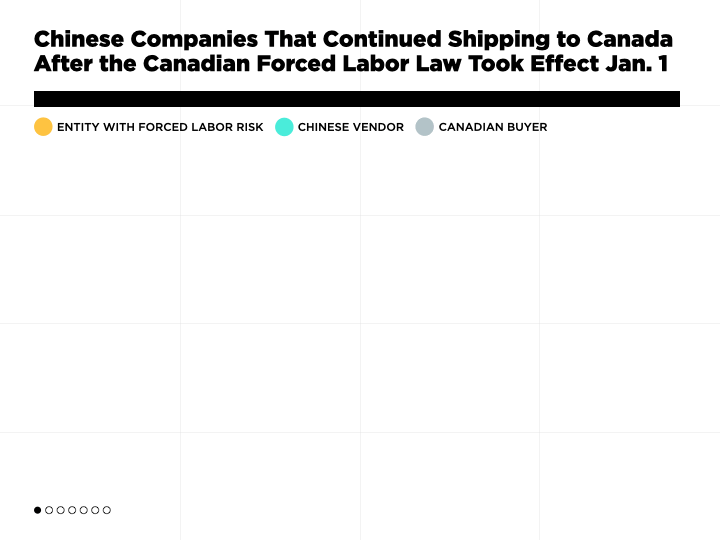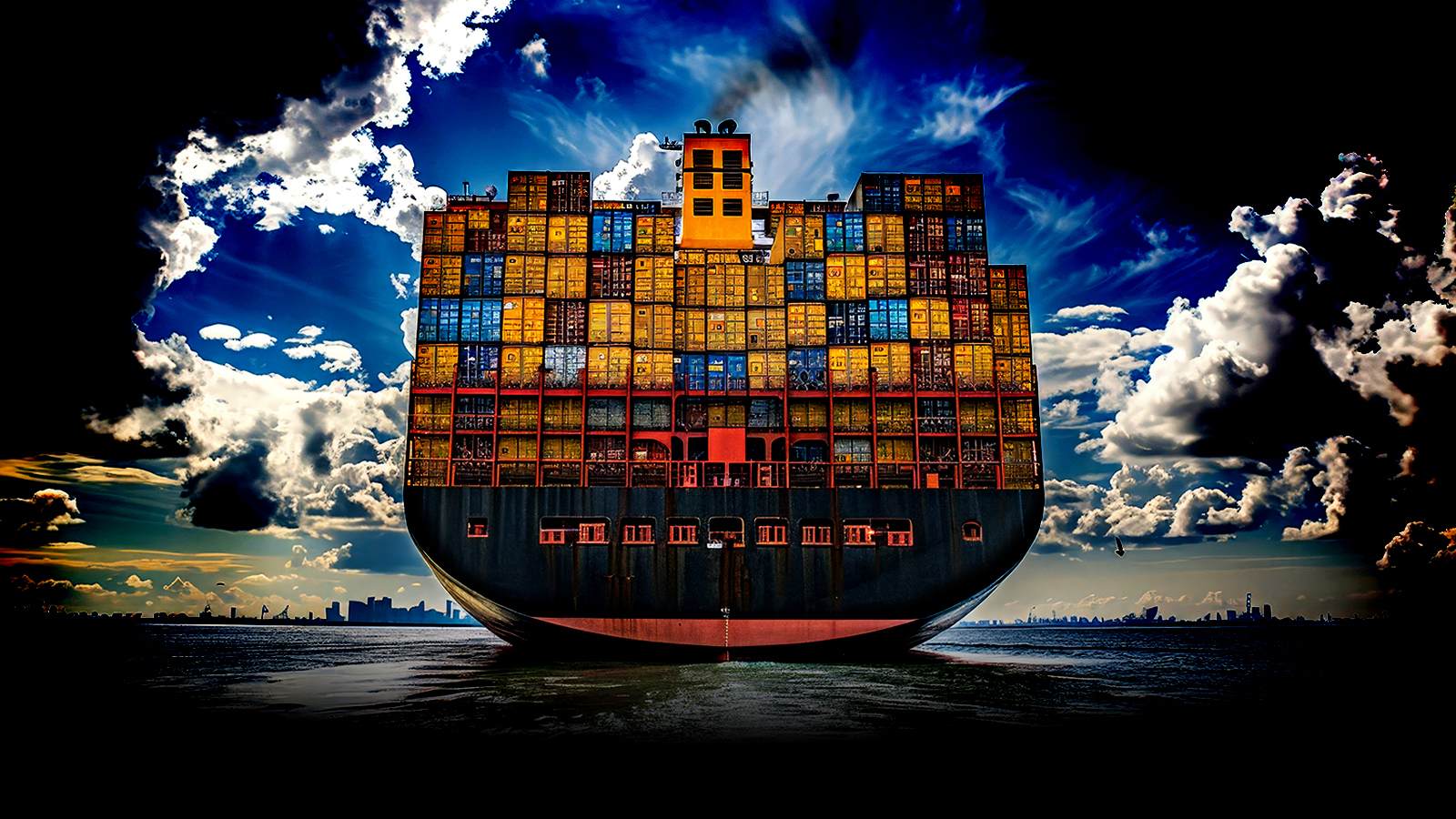Kharon examined 18 Chinese businesses with exposure to forced labor in Xinjiang — a region known for widespread allegations of forced labor — that have been shipping products to Canadian companies in recent years. Nearly half of these companies have continued to make shipments as recently as August, despite a Canadian law that went into effect on Jan. 1 to prevent such activities.
These items, which include food products, auto parts, and batteries, have been transiting to U.S. ports, including Seattle and Tacoma, Washington, before presumably making their way into Canada.
A review of the latest trade data reveals that eight of these companies continued to ship products to Canada in or after January following the implementation of the Canadian forced labor law.
These items, which include food products, auto parts, and batteries, have been transiting to U.S. ports, including Seattle and Tacoma, Washington, before presumably making their way into Canada.
A review of the latest trade data reveals that eight of these companies continued to ship products to Canada in or after January following the implementation of the Canadian forced labor law.

Kharon users can explore this Insight, including all 18 Chinese companies, directly in the ClearView portal.
The law places responsibility on businesses to ensure their global supply chains are free from forced and child labor. It imposes stringent due diligence and reporting requirements, challenging Canadian companies to track their suppliers, assess risks, and report on their efforts to tackle these human rights abuses.
Canadian businesses are now required to examine where they source materials and how their products are manufactured — right down to the raw materials.
Similarly, in 2021, the U.S. passed the Uyghur Forced Labor Prevention Act (UFLPA) which went into effect in 2022. The law bans goods produced in Xinjiang from entering the U.S. and imposes sanctions on entities that participate in or benefit from forced labor in China.
Since the implementation of the UFLPA, the U.S. Customs and Border Protection (CBP) has detained and inspected more than 9,000 shipments worth over $3.5 billion. So far, 73 entities have been added to the UFLPA entity list.
However, unlike the UFLPA, the Canadian law does not target China specifically; instead, it focuses on forced labor more broadly.
Although the shipments analyzed by Kharon were transiting U.S. ports, Kharon was not able to determine whether CBP detained the shipments for inspection, denied them entry, or released them for their final destination in Canada.
Canadian businesses are now required to examine where they source materials and how their products are manufactured — right down to the raw materials.
Similarly, in 2021, the U.S. passed the Uyghur Forced Labor Prevention Act (UFLPA) which went into effect in 2022. The law bans goods produced in Xinjiang from entering the U.S. and imposes sanctions on entities that participate in or benefit from forced labor in China.
Since the implementation of the UFLPA, the U.S. Customs and Border Protection (CBP) has detained and inspected more than 9,000 shipments worth over $3.5 billion. So far, 73 entities have been added to the UFLPA entity list.
However, unlike the UFLPA, the Canadian law does not target China specifically; instead, it focuses on forced labor more broadly.
Although the shipments analyzed by Kharon were transiting U.S. ports, Kharon was not able to determine whether CBP detained the shipments for inspection, denied them entry, or released them for their final destination in Canada.
What Does It Mean to Have Risk or Exposure to Xinjiang Forced Labor?
• Receiving Xinjiang labor under conditions that meet one or more of the U.S. government’s red flag indicators for forced labor.
• Owning manufacturing subsidiaries in Xinjiang, particularly those located in or near prisons and/or government-run industrial parks involved in labor transfer programs.
• Supply chains containing direct or indirect suppliers that match the above criteria.
• Supply chains containing Xinjiang-origin items, in particular items identified by the U.S. government as produced by forced labor
• Any combination of the above
• Receiving Xinjiang labor under conditions that meet one or more of the U.S. government’s red flag indicators for forced labor.
• Owning manufacturing subsidiaries in Xinjiang, particularly those located in or near prisons and/or government-run industrial parks involved in labor transfer programs.
• Supply chains containing direct or indirect suppliers that match the above criteria.
• Supply chains containing Xinjiang-origin items, in particular items identified by the U.S. government as produced by forced labor
• Any combination of the above
U.S. lawmakers urge Canada, Mexico to step up enforcement
A group of bipartisan lawmakers sent a letter in September to U.S., Canadian and Mexican officials urging them to strengthen existing forced labor regulation, and requested greater collaboration between the three countries to prevent tainted goods from entering North America.
The lawmakers suggested that the UFLPA “can serve as a model” for similar laws in Canada and Mexico.
“Central to this goal is the UFLPA’s ‘rebuttable presumption,’ which places the burden on importers to prove that their supply chains do not include goods produced or mined, wholly or in part, in the [Xinjiang region] or through a state-imposed labor transfer program,” the letter said.
The lawmakers also mentioned that they were notified by CBP officials that a shipment of solar panels that was denied entry into the U.S. was later imported into Canada, “followed by an attempt to re-export them into the U.S.”
“We urge parties to the USMCA [United States-Mexico-Canada Agreement] to utilize existing information-sharing agreements to stop the transfer of forced labor products as well as identified re-export or transshipment schemes,” the letter noted.
According to media reports, the Canada Border Services Agency said it has intercepted over 50 shipments since 2021 because it suspected that the products were made with forced labor. Though most of those shipments were allowed in.
A group of bipartisan lawmakers sent a letter in September to U.S., Canadian and Mexican officials urging them to strengthen existing forced labor regulation, and requested greater collaboration between the three countries to prevent tainted goods from entering North America.
The lawmakers suggested that the UFLPA “can serve as a model” for similar laws in Canada and Mexico.
“Central to this goal is the UFLPA’s ‘rebuttable presumption,’ which places the burden on importers to prove that their supply chains do not include goods produced or mined, wholly or in part, in the [Xinjiang region] or through a state-imposed labor transfer program,” the letter said.
The lawmakers also mentioned that they were notified by CBP officials that a shipment of solar panels that was denied entry into the U.S. was later imported into Canada, “followed by an attempt to re-export them into the U.S.”
“We urge parties to the USMCA [United States-Mexico-Canada Agreement] to utilize existing information-sharing agreements to stop the transfer of forced labor products as well as identified re-export or transshipment schemes,” the letter noted.
According to media reports, the Canada Border Services Agency said it has intercepted over 50 shipments since 2021 because it suspected that the products were made with forced labor. Though most of those shipments were allowed in.







